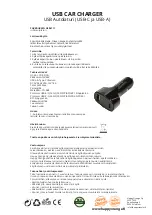
Front Manual Seat(s)
*1
Adjusting the Head Restraints
Your vehicle is equipped with head
restraints in all seating positions. Head
restraints are most effective for protection
against whiplash and other rear-impact
crash injuries.
The center of the back of the occupant’s
head should rest against the center of the
restraint. The tops of the occupant’s ears
should be level with the center height of
the restraint.
For a head restraint system to work properly:
*1 - If equipped
VEHICLE CONTROLS
40 |
• Do not hang any items on the head restraints or from the restraint legs.
• Do not place any objects between an occupant and the seat-back.
• Install each restraint in its proper location.
Improperly positioning head restraints reduces their effectiveness and
increases the likelihood of serious injury in a crash.
Make sure head restraints are in place and positioned properly before driving.
n
Adjusting the Front Head Restraints
To raise the head restraint: Pull it
upward.
To lower the head restraint: Push it
down while pressing the release
button.
n
Removing and Reinstalling the Head Restraints
Head restraints can be removed for cleaning or repair.
To remove the
head restraint:
Pull the restraint up as far as it will go. Then push the
release button(s), and pull the restraint up and out.
To reinstall a
head restraint:
Insert the legs back in place, then adjust the head
restraint to an appropriate height while pressing the
release button(s). Pull up on the restraint to make sure it
is locked in position.
Failure to reinstall, or correctly reinstall, the head restraints can result in
severe injury during a crash.
Always replace the head restraints before driving.
Adjusting the Rear Seats
n
Folding Down the Rear Seats
The rear seat back(s) can be folded down to accommodate bulkier items in
the trunk .
To fold down the seat:
VEHICLE CONTROLS
| 41
















































